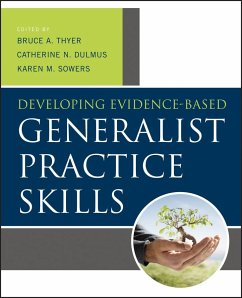Bruce A. Thyer, Catherine N. Dulmus, Karen M. Sowers
Developing Evidence-Based Generalist Practice Skills
Bruce A. Thyer, Catherine N. Dulmus, Karen M. Sowers
Developing Evidence-Based Generalist Practice Skills
- Broschiertes Buch
- Merkliste
- Auf die Merkliste
- Bewerten Bewerten
- Teilen
- Produkt teilen
- Produkterinnerung
- Produkterinnerung
With contributions from the leading scholars in social work, this edited text provides a solid foundation of generalist practice skills for students and social workers. Creating a resource that covers generalist practice skills appropriate for students and practitioners, the authors begin by stressing the importance of evidence-based practice and cover key areas from intake through intervention and termination. Each chapter covers the theoretical basis for each type of practice as well as the practice implications for social work.
Andere Kunden interessierten sich auch für
![Applying Theory to Generalist Social Work Practice Applying Theory to Generalist Social Work Practice]() Carol L. LangerApplying Theory to Generalist Social Work Practice73,99 €
Carol L. LangerApplying Theory to Generalist Social Work Practice73,99 €![Social Work Practice with Individuals and Families Social Work Practice with Individuals and Families]() Michael J. HoloskoSocial Work Practice with Individuals and Families63,99 €
Michael J. HoloskoSocial Work Practice with Individuals and Families63,99 €![Evidence and Evaluation in Social Policy Evidence and Evaluation in Social Policy]() Evidence and Evaluation in Social Policy40,99 €
Evidence and Evaluation in Social Policy40,99 €![Case Studies in Social Work Practice Case Studies in Social Work Practice]() Case Studies in Social Work Practice51,99 €
Case Studies in Social Work Practice51,99 €![Sociology for Social Workers Sociology for Social Workers]() Anne LlewellynSociology for Social Workers40,99 €
Anne LlewellynSociology for Social Workers40,99 €![Sociology for Social Workers Sociology for Social Workers]() Anne LlewellynSociology for Social Workers94,99 €
Anne LlewellynSociology for Social Workers94,99 €![Case Studies in Child, Adolescent, and Family Treatment Case Studies in Child, Adolescent, and Family Treatment]() Craig W. LeCroyCase Studies in Child, Adolescent, and Family Treatment63,99 €
Craig W. LeCroyCase Studies in Child, Adolescent, and Family Treatment63,99 €-
-
-
With contributions from the leading scholars in social work, this edited text provides a solid foundation of generalist practice skills for students and social workers. Creating a resource that covers generalist practice skills appropriate for students and practitioners, the authors begin by stressing the importance of evidence-based practice and cover key areas from intake through intervention and termination. Each chapter covers the theoretical basis for each type of practice as well as the practice implications for social work.
Hinweis: Dieser Artikel kann nur an eine deutsche Lieferadresse ausgeliefert werden.
Hinweis: Dieser Artikel kann nur an eine deutsche Lieferadresse ausgeliefert werden.
Produktdetails
- Produktdetails
- Verlag: Wiley & Sons
- 1. Auflage
- Seitenzahl: 264
- Erscheinungstermin: 9. Januar 2013
- Englisch
- Abmessung: 233mm x 189mm x 17mm
- Gewicht: 474g
- ISBN-13: 9781118176962
- ISBN-10: 1118176960
- Artikelnr.: 36686003
- Herstellerkennzeichnung
- Libri GmbH
- Europaallee 1
- 36244 Bad Hersfeld
- gpsr@libri.de
- Verlag: Wiley & Sons
- 1. Auflage
- Seitenzahl: 264
- Erscheinungstermin: 9. Januar 2013
- Englisch
- Abmessung: 233mm x 189mm x 17mm
- Gewicht: 474g
- ISBN-13: 9781118176962
- ISBN-10: 1118176960
- Artikelnr.: 36686003
- Herstellerkennzeichnung
- Libri GmbH
- Europaallee 1
- 36244 Bad Hersfeld
- gpsr@libri.de
BRUCE A. THYER, PhD, LCSW, is Professor and former dean of the College of Social Work at Florida State University. He is the founding and current editor of the bimonthly journal Research on Social Work Practice. CATHERINE N. DULMUS, PhD, LCSW, is Professor, Associate Dean for Research, and Director of the Buffalo Center for Social Research in the School of Social Work at the University at Buffalo, SUNY, and Research Director at Hillside Family of Agencies in Rochester, New York. KAREN M. SOWERS, PhD, is Dean and Beaman Professor in the College of Social Work at the University of Tennessee, Knoxville. Her research interests include juvenile justice, sexuality, social work education, child welfare, evidence-based practice, and international social work practice.
Preface xi
About the Editors xv
Contributors xvii
Chapter 1 Evidence-Informed Practice 1
Eileen Gambrill
What Is Evidence-Informed Practice? 2
Three Philosophies of Evidence-Based Practice 7
Different Kinds of Questions 8
Different Styles of Evidence-Based Practice 9
Examples of Evidence-Based Decision Making 10
Hallmarks and Implications of the Philosophy of Evidence-Based Practice and
Care 11
Educational Implications 15
Controversies 16
Obstacles 17
Conclusion 18
Key Terms 19
Review Questions for Critical Thinking 19
Online Resources 20
References 20
Chapter 2 Trauma-Informed Practice 25
Nancy J. Smyth and Laura Greyber
Overview 25
Defining Trauma 26
Risk Factors 29
Social Work and Trauma 29
Assessment of Trauma 30
Interventions for Trauma 34
Key Terms 45
Review Questions for Critical Thinking 45
Online Resources 45
References 46
Chapter 3 Interviewing Skills 51
Francis J. Turner
Introduction 51
Definition 52
Interviewing as an Art 53
Interviewer Challenges 53
The Helping Relationship 54
Techniques or Values 55
An Ethical Issue 56
Interviewing Modalities 57
Other Interviewing Modalities 60
Use of Interpreters 62
The Interview Setting 63
Interviewing Techniques 65
Conclusion 66
Key Terms 66
Review Questions for Critical Thinking 67
Online Resources 67
References 67
Chapter 4 Problem Identification, Contracting, and Case Planning 69
Sophia F. Dziegielewski
Introduction 69
Historical Background 70
Importance of Evidence-Based Documentation Skills 71
Using Evidence-Based Principles in Problem Identification and Case Planning
75
Creating the Problem Statement 76
Measuring the Problem Behavior 77
Developing the Service or Case Plan 79
Recordkeeping and the Problem-Oriented Record 85
Conclusion 89
Key Terms 89
Review Questions for Critical Thinking 89
Online Resources 90
References 90
Chapter 5 Case Management 93
Valerie Holton and Joseph Walsh
Models of Case Management 94
Historical Background of Case Management 100
Summary of Current Evidence-Based Information on Case Management 105
Implications for Social Work on Micro, Mezzo, and Macro Levels 112
Limitations 114
Conclusion 114
Key Terms 115
Review Questions for Critical Thinking 115
Online Resources 115
References 116
Chapter 6 Advocacy 123
Malabika Misty Das, Cheryl Hiu-Kwan Chui, and Cecilia Lai-Wan Chan
Advocacy and Social Work 123
Definitions and Classifications 124
Creating Advocacy Culture 125
Advocacy in Clinical Social Work 128
Advocacy in Macro Social Work 130
Multimodal Strategies and Approaches 134
National and International Advocacy Movements 141
Conclusion 143
Key Terms 143
Review Questions for Critical Thinking 143
Online Resources 143
References 144
Chapter 7 Crisis Intervention 149
Kenneth R. Yeager, Albert R. Roberts, and Wendy Grainger
Introduction 149
Trends in Crisis Intervention 150
Prevalence and Impact of Emotional Trauma 150
Historical Background 154
Roberts's Seven-Stage Practice Model for Crisis Intervention 156
Summary of Current Evidence-Based and Informed Information on Crisis
Intervention 160
Challenges in Implementing Evidence-Based Practice 165
Conclusion 169
Key Terms 170
Review Questions for Critical Thinking 170
Online Resources 170
References 171
Chapter 8 Practice Evaluation 177
Bruce A. Thyer
Brief Background 178
Evidence-Based Information on Practice Evaluation 179
Case Studies 181
The B Design 182
The AB Design 185
The ABA Design 186
The ABAB Design 188
Multiple Baseline Designs 188
Alternating Treatments Design 191
Is There a Hierarchy of Research Evidence? 193
Limitations of This Approach 195
Implications for Social Work on Micro, Mezzo, and Macro Levels 197
Conclusion 198
Key Terms 199
Review Questions for Critical Thinking 199
Online Resources 199
References 200
Chapter 9 Termination, Stabilization, and Continuity of Care 205
Samuel A. MacMaster and Sara Sanders
Historical Trends 206
A Broader Perspective on Service Delivery 206
Importance of Termination and Stabilization 209
Stabilization 211
Case Management, Brief Therapy, and Crisis Intervention 212
Conclusion 217
Key Terms 217
Review Questions for Critical Thinking 218
Online Resources 218
References 218
Author Index 223
Subject Index 231
About the Editors xv
Contributors xvii
Chapter 1 Evidence-Informed Practice 1
Eileen Gambrill
What Is Evidence-Informed Practice? 2
Three Philosophies of Evidence-Based Practice 7
Different Kinds of Questions 8
Different Styles of Evidence-Based Practice 9
Examples of Evidence-Based Decision Making 10
Hallmarks and Implications of the Philosophy of Evidence-Based Practice and
Care 11
Educational Implications 15
Controversies 16
Obstacles 17
Conclusion 18
Key Terms 19
Review Questions for Critical Thinking 19
Online Resources 20
References 20
Chapter 2 Trauma-Informed Practice 25
Nancy J. Smyth and Laura Greyber
Overview 25
Defining Trauma 26
Risk Factors 29
Social Work and Trauma 29
Assessment of Trauma 30
Interventions for Trauma 34
Key Terms 45
Review Questions for Critical Thinking 45
Online Resources 45
References 46
Chapter 3 Interviewing Skills 51
Francis J. Turner
Introduction 51
Definition 52
Interviewing as an Art 53
Interviewer Challenges 53
The Helping Relationship 54
Techniques or Values 55
An Ethical Issue 56
Interviewing Modalities 57
Other Interviewing Modalities 60
Use of Interpreters 62
The Interview Setting 63
Interviewing Techniques 65
Conclusion 66
Key Terms 66
Review Questions for Critical Thinking 67
Online Resources 67
References 67
Chapter 4 Problem Identification, Contracting, and Case Planning 69
Sophia F. Dziegielewski
Introduction 69
Historical Background 70
Importance of Evidence-Based Documentation Skills 71
Using Evidence-Based Principles in Problem Identification and Case Planning
75
Creating the Problem Statement 76
Measuring the Problem Behavior 77
Developing the Service or Case Plan 79
Recordkeeping and the Problem-Oriented Record 85
Conclusion 89
Key Terms 89
Review Questions for Critical Thinking 89
Online Resources 90
References 90
Chapter 5 Case Management 93
Valerie Holton and Joseph Walsh
Models of Case Management 94
Historical Background of Case Management 100
Summary of Current Evidence-Based Information on Case Management 105
Implications for Social Work on Micro, Mezzo, and Macro Levels 112
Limitations 114
Conclusion 114
Key Terms 115
Review Questions for Critical Thinking 115
Online Resources 115
References 116
Chapter 6 Advocacy 123
Malabika Misty Das, Cheryl Hiu-Kwan Chui, and Cecilia Lai-Wan Chan
Advocacy and Social Work 123
Definitions and Classifications 124
Creating Advocacy Culture 125
Advocacy in Clinical Social Work 128
Advocacy in Macro Social Work 130
Multimodal Strategies and Approaches 134
National and International Advocacy Movements 141
Conclusion 143
Key Terms 143
Review Questions for Critical Thinking 143
Online Resources 143
References 144
Chapter 7 Crisis Intervention 149
Kenneth R. Yeager, Albert R. Roberts, and Wendy Grainger
Introduction 149
Trends in Crisis Intervention 150
Prevalence and Impact of Emotional Trauma 150
Historical Background 154
Roberts's Seven-Stage Practice Model for Crisis Intervention 156
Summary of Current Evidence-Based and Informed Information on Crisis
Intervention 160
Challenges in Implementing Evidence-Based Practice 165
Conclusion 169
Key Terms 170
Review Questions for Critical Thinking 170
Online Resources 170
References 171
Chapter 8 Practice Evaluation 177
Bruce A. Thyer
Brief Background 178
Evidence-Based Information on Practice Evaluation 179
Case Studies 181
The B Design 182
The AB Design 185
The ABA Design 186
The ABAB Design 188
Multiple Baseline Designs 188
Alternating Treatments Design 191
Is There a Hierarchy of Research Evidence? 193
Limitations of This Approach 195
Implications for Social Work on Micro, Mezzo, and Macro Levels 197
Conclusion 198
Key Terms 199
Review Questions for Critical Thinking 199
Online Resources 199
References 200
Chapter 9 Termination, Stabilization, and Continuity of Care 205
Samuel A. MacMaster and Sara Sanders
Historical Trends 206
A Broader Perspective on Service Delivery 206
Importance of Termination and Stabilization 209
Stabilization 211
Case Management, Brief Therapy, and Crisis Intervention 212
Conclusion 217
Key Terms 217
Review Questions for Critical Thinking 218
Online Resources 218
References 218
Author Index 223
Subject Index 231
Preface xi
About the Editors xv
Contributors xvii
Chapter 1 Evidence-Informed Practice 1
Eileen Gambrill
What Is Evidence-Informed Practice? 2
Three Philosophies of Evidence-Based Practice 7
Different Kinds of Questions 8
Different Styles of Evidence-Based Practice 9
Examples of Evidence-Based Decision Making 10
Hallmarks and Implications of the Philosophy of Evidence-Based Practice and
Care 11
Educational Implications 15
Controversies 16
Obstacles 17
Conclusion 18
Key Terms 19
Review Questions for Critical Thinking 19
Online Resources 20
References 20
Chapter 2 Trauma-Informed Practice 25
Nancy J. Smyth and Laura Greyber
Overview 25
Defining Trauma 26
Risk Factors 29
Social Work and Trauma 29
Assessment of Trauma 30
Interventions for Trauma 34
Key Terms 45
Review Questions for Critical Thinking 45
Online Resources 45
References 46
Chapter 3 Interviewing Skills 51
Francis J. Turner
Introduction 51
Definition 52
Interviewing as an Art 53
Interviewer Challenges 53
The Helping Relationship 54
Techniques or Values 55
An Ethical Issue 56
Interviewing Modalities 57
Other Interviewing Modalities 60
Use of Interpreters 62
The Interview Setting 63
Interviewing Techniques 65
Conclusion 66
Key Terms 66
Review Questions for Critical Thinking 67
Online Resources 67
References 67
Chapter 4 Problem Identification, Contracting, and Case Planning 69
Sophia F. Dziegielewski
Introduction 69
Historical Background 70
Importance of Evidence-Based Documentation Skills 71
Using Evidence-Based Principles in Problem Identification and Case Planning
75
Creating the Problem Statement 76
Measuring the Problem Behavior 77
Developing the Service or Case Plan 79
Recordkeeping and the Problem-Oriented Record 85
Conclusion 89
Key Terms 89
Review Questions for Critical Thinking 89
Online Resources 90
References 90
Chapter 5 Case Management 93
Valerie Holton and Joseph Walsh
Models of Case Management 94
Historical Background of Case Management 100
Summary of Current Evidence-Based Information on Case Management 105
Implications for Social Work on Micro, Mezzo, and Macro Levels 112
Limitations 114
Conclusion 114
Key Terms 115
Review Questions for Critical Thinking 115
Online Resources 115
References 116
Chapter 6 Advocacy 123
Malabika Misty Das, Cheryl Hiu-Kwan Chui, and Cecilia Lai-Wan Chan
Advocacy and Social Work 123
Definitions and Classifications 124
Creating Advocacy Culture 125
Advocacy in Clinical Social Work 128
Advocacy in Macro Social Work 130
Multimodal Strategies and Approaches 134
National and International Advocacy Movements 141
Conclusion 143
Key Terms 143
Review Questions for Critical Thinking 143
Online Resources 143
References 144
Chapter 7 Crisis Intervention 149
Kenneth R. Yeager, Albert R. Roberts, and Wendy Grainger
Introduction 149
Trends in Crisis Intervention 150
Prevalence and Impact of Emotional Trauma 150
Historical Background 154
Roberts's Seven-Stage Practice Model for Crisis Intervention 156
Summary of Current Evidence-Based and Informed Information on Crisis
Intervention 160
Challenges in Implementing Evidence-Based Practice 165
Conclusion 169
Key Terms 170
Review Questions for Critical Thinking 170
Online Resources 170
References 171
Chapter 8 Practice Evaluation 177
Bruce A. Thyer
Brief Background 178
Evidence-Based Information on Practice Evaluation 179
Case Studies 181
The B Design 182
The AB Design 185
The ABA Design 186
The ABAB Design 188
Multiple Baseline Designs 188
Alternating Treatments Design 191
Is There a Hierarchy of Research Evidence? 193
Limitations of This Approach 195
Implications for Social Work on Micro, Mezzo, and Macro Levels 197
Conclusion 198
Key Terms 199
Review Questions for Critical Thinking 199
Online Resources 199
References 200
Chapter 9 Termination, Stabilization, and Continuity of Care 205
Samuel A. MacMaster and Sara Sanders
Historical Trends 206
A Broader Perspective on Service Delivery 206
Importance of Termination and Stabilization 209
Stabilization 211
Case Management, Brief Therapy, and Crisis Intervention 212
Conclusion 217
Key Terms 217
Review Questions for Critical Thinking 218
Online Resources 218
References 218
Author Index 223
Subject Index 231
About the Editors xv
Contributors xvii
Chapter 1 Evidence-Informed Practice 1
Eileen Gambrill
What Is Evidence-Informed Practice? 2
Three Philosophies of Evidence-Based Practice 7
Different Kinds of Questions 8
Different Styles of Evidence-Based Practice 9
Examples of Evidence-Based Decision Making 10
Hallmarks and Implications of the Philosophy of Evidence-Based Practice and
Care 11
Educational Implications 15
Controversies 16
Obstacles 17
Conclusion 18
Key Terms 19
Review Questions for Critical Thinking 19
Online Resources 20
References 20
Chapter 2 Trauma-Informed Practice 25
Nancy J. Smyth and Laura Greyber
Overview 25
Defining Trauma 26
Risk Factors 29
Social Work and Trauma 29
Assessment of Trauma 30
Interventions for Trauma 34
Key Terms 45
Review Questions for Critical Thinking 45
Online Resources 45
References 46
Chapter 3 Interviewing Skills 51
Francis J. Turner
Introduction 51
Definition 52
Interviewing as an Art 53
Interviewer Challenges 53
The Helping Relationship 54
Techniques or Values 55
An Ethical Issue 56
Interviewing Modalities 57
Other Interviewing Modalities 60
Use of Interpreters 62
The Interview Setting 63
Interviewing Techniques 65
Conclusion 66
Key Terms 66
Review Questions for Critical Thinking 67
Online Resources 67
References 67
Chapter 4 Problem Identification, Contracting, and Case Planning 69
Sophia F. Dziegielewski
Introduction 69
Historical Background 70
Importance of Evidence-Based Documentation Skills 71
Using Evidence-Based Principles in Problem Identification and Case Planning
75
Creating the Problem Statement 76
Measuring the Problem Behavior 77
Developing the Service or Case Plan 79
Recordkeeping and the Problem-Oriented Record 85
Conclusion 89
Key Terms 89
Review Questions for Critical Thinking 89
Online Resources 90
References 90
Chapter 5 Case Management 93
Valerie Holton and Joseph Walsh
Models of Case Management 94
Historical Background of Case Management 100
Summary of Current Evidence-Based Information on Case Management 105
Implications for Social Work on Micro, Mezzo, and Macro Levels 112
Limitations 114
Conclusion 114
Key Terms 115
Review Questions for Critical Thinking 115
Online Resources 115
References 116
Chapter 6 Advocacy 123
Malabika Misty Das, Cheryl Hiu-Kwan Chui, and Cecilia Lai-Wan Chan
Advocacy and Social Work 123
Definitions and Classifications 124
Creating Advocacy Culture 125
Advocacy in Clinical Social Work 128
Advocacy in Macro Social Work 130
Multimodal Strategies and Approaches 134
National and International Advocacy Movements 141
Conclusion 143
Key Terms 143
Review Questions for Critical Thinking 143
Online Resources 143
References 144
Chapter 7 Crisis Intervention 149
Kenneth R. Yeager, Albert R. Roberts, and Wendy Grainger
Introduction 149
Trends in Crisis Intervention 150
Prevalence and Impact of Emotional Trauma 150
Historical Background 154
Roberts's Seven-Stage Practice Model for Crisis Intervention 156
Summary of Current Evidence-Based and Informed Information on Crisis
Intervention 160
Challenges in Implementing Evidence-Based Practice 165
Conclusion 169
Key Terms 170
Review Questions for Critical Thinking 170
Online Resources 170
References 171
Chapter 8 Practice Evaluation 177
Bruce A. Thyer
Brief Background 178
Evidence-Based Information on Practice Evaluation 179
Case Studies 181
The B Design 182
The AB Design 185
The ABA Design 186
The ABAB Design 188
Multiple Baseline Designs 188
Alternating Treatments Design 191
Is There a Hierarchy of Research Evidence? 193
Limitations of This Approach 195
Implications for Social Work on Micro, Mezzo, and Macro Levels 197
Conclusion 198
Key Terms 199
Review Questions for Critical Thinking 199
Online Resources 199
References 200
Chapter 9 Termination, Stabilization, and Continuity of Care 205
Samuel A. MacMaster and Sara Sanders
Historical Trends 206
A Broader Perspective on Service Delivery 206
Importance of Termination and Stabilization 209
Stabilization 211
Case Management, Brief Therapy, and Crisis Intervention 212
Conclusion 217
Key Terms 217
Review Questions for Critical Thinking 218
Online Resources 218
References 218
Author Index 223
Subject Index 231








